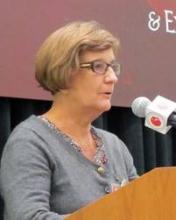SAN DIEGO – Adding low doses of gemtuzumab to standard chemotherapy extends survival in de novo acute myeloid leukemia without the toxicity that triggered the monoclonal antibody to be taken off the market in the United States last year, a study has shown.
Median event-free survival among 280 patients, aged 50-70 years, was increased from 11.9 months with standard daunorubicin (Cerubidine) and cytarabine (Ara-C) chemotherapy to 19.6 months with the addition of gemtuzumab ozogamicin (Mylotarg).
The 2-year estimate of event-free survival was 16.5% vs. 41.1% (log-rank P value = .00018; hazard ratio, 0.57).
This translated into an increase in median overall survival from 19.2 months to 34 months with the addition of gemtuzumab, Dr. Sylvie Castaigne reported on behalf of the Acute Leukemia French Association (ALFA) at the annual meeting of the American Society of Hematology. The 2-year overall survival estimate was 43.5% vs. 53.1% (log rank P = .046; HR, 0.70).
Notably, this improvement in survival was not present in patients with unfavorable cytogenetics, comprising 23% of the gemtuzumab group.
At the urging of the U.S. Food and Drug Administration, Pfizer voluntarily withdrew gemtuzumab from the market in June 2010, because of concerns about its toxicity and lack of clinical benefit in patients with acute myeloid leukemia (AML).
The drug remains available in Europe on a compassionate basis for relapsed AML, but not in the frontline setting, according to Dr. Castaigne, professor of hematology at Hôpital de Versailles (France).
When asked during a press briefing whether the current data could resurrect gemtuzumab in the United States or be parlayed into a new indication in Europe, she said, "I think many physicians will ask Pfizer to get the drug on the market."
Dr. Armand Keating, ASH president-elect, who moderated the presentation of the study, said in an interview that "I think it has the potential to change practice, but my concern is that there may be more side effects than are being reported in this particular study and certainly there were previous reports of veno-occlusive disease."
Dr. Castaigne reported three episodes of veno-occlusive disease, two of which were fatal. Prolonged grade 3 or greater thrombocytopenia occurred in 19 patients.
Dr. Martin Tallman, chief of the leukemia service at Memorial Sloan-Kettering Cancer Center in New York City, agreed that the data are impressive, but also expressed concern about the veno-occlusive disease events.
"Would I add gemtuzumab to my next patient Monday morning with favorable cytogenic risk, off study? No," he said in an interview. "Does it change standard of care? No.
"It is impressive, but I think we need more studies."
Still, Dr. Tallman said that he would advise Pfizer to bring gemtuzumab back on the market for clinical trials, and that a Pfizer executive told him during the presentation that Pfizer would see what it could do.
Dr. Keating, director of hematology at the University of Toronto, said the new data might lead to a consideration of putting gemtuzumab back on the market. "I think it would be very reasonable," he added.
Only 13,000 new patients are diagnosed each year in the United States with AML, but there are 9,000 deaths. Overall survival has improved among younger adults, but there is no evidence of improvement among older adults in 4 decades of investigation, Dr. Castaigne said.
The ALFA group opted to pursue gemtuzumab in AML based on phase I data suggesting that repeated lower-dose infusions would reduce the toxicity associated with the previous 9-mg/m2 dose given on days 1 and 14, while enhancing the efficacy of gemtuzumab.
From January 2008 to November 2010, 280 patients were randomized to chemotherapy with daunorubicin 60 mg/m2 on days 1-3 and cytarabine 200 mg/m2 on days 1-7 with or without gemtuzumab 3 mg/m2 on days 1, 4 and 7. Two patients withdrew consent, and were excluded from the analysis. Their median age was 62 years.
"Would I add gemtuzumab to my next patient Monday morning with favorable cytogenic risk, off study? No."
If bone marrow blasts were more than 10% at day 15, a second course of daunorubicin 60 mg/m2 on days 1 and 2 and cytarabine 1 g/m2 every 12 hours on days 1-3 was given.
Two rounds of consolidation chemotherapy were given to patients who experienced a complete response.
Median relapse-free survival among complete responders was 12.5 months in the control group and 28.1 months in the gemtuzumab group, with 21.7% vs. 50.8% alive at 2 years (log-rank P value = .00029; HR, 0.51), Dr. Castaigne said.
The rate of fatal events possibly related to treatment was similar at 6.7% in the chemotherapy group and 8.7% in the gemtuzumab group, she said.


